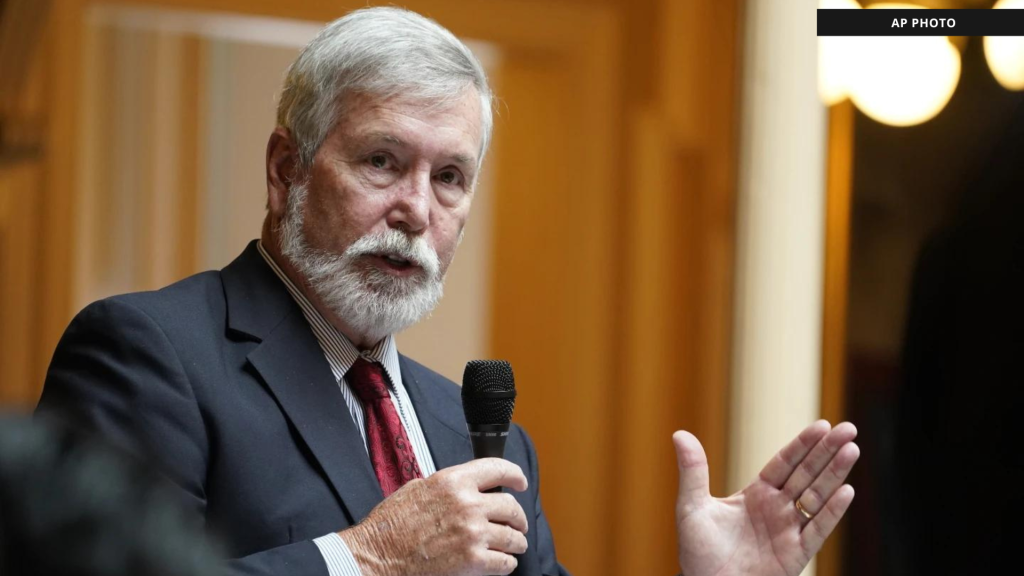RICHMOND, Va. (AP) — Top Virginia legislators said Tuesday that talks in Richmond about the long-running partisan impasse over updates to the state budget have broken down and negotiators have been sent home.
Barry Knight, the Republican chairman of the House Appropriations Committee, and George Barker, co-chair of the Senate Finance and Appropriations Committee, both confirmed in interviews that further meetings this week had been scuttled. But their accounts about what transpired differed, with Knight saying Democrats had backed away from a previously agreed-upon outline of a deal that would have included both tax cuts and rebates, and Barker saying Republicans were refusing to negotiate.
“I don’t know where we go from here,” Knight said. “I have told my conferees to go home. They told their conferees to go home.”
Republicans who control the House of Delegates and Democrats who control the Senate have been at odds for months over adjustments to the spending plan that was signed into law last year.
Virginia operates on a two-year budget, with the plan initially adopted in even-numbered years and amended in odd-numbered years. During the regular session earlier this year, lawmakers sent Republican Gov. Glenn Youngkin what they called a “skinny budget” with just a handful of allocations after failing at the last minute to reach an agreement on the broader plan.
House Republicans initially sought additional tax cuts Youngkin has prioritized, including a reduction to the corporate tax rate. Senate Democrats said at the time that tax cuts beyond the $4 billion they agreed to last year would be irresponsible with a possible recession on the horizon. They instead wanted the surplus invested in government services.
Because there’s already an underlying spending plan in place, the lack of budget legislation this year won’t stop the functioning of the state government, even when the current fiscal year ends at the end of the month. But billions of taxpayer dollars continue to be essentially on hold — hoarded, as a former finance secretary put it — not directed toward either government services or tax relief. Other policy matters ranging from potential casino siting language to public employee raises are also tied up in the negotiations.
Knight said he and Senate Democratic leaders had reached the broad outlines of a deal by the end of the regular legislative session in February. But Barker then “backed off,” citing concerns about passing a budget that would give Republicans any perceived wins while he was in the midst of an ultra-competitive primary, Knight alleged.
“I said … I don’t mind kicking it until after your primary. George says, ‘Fine, I would love for you to do that. Thank you. Thank you. Thank you,’” Knight said.
Barker, who was one of five Senate incumbents ousted in Tuesday’s primary, said his race against Fairfax County school board member Stella Pekarsky had nothing to do with the delay and that he never made any commitment to Knight.
“He talked about these things, and I just let him talk. I never said anything that was agreeing with him or disagreeing with him,” Barker said.
Knight described an agreement that would have included both tax rebates and permanent changes to Virginia’s tax structure and tax brackets, with spending on Democratic priorities in a roughly equal amount, plus other spending on shared priorities, like salary increases for public workers. Youngkin’s proposed corporate tax cuts were a nonstarter for Senate Democrats and were no longer included in the agreed-upon deal, he said.
Barker said Senate budget negotiators put forward a proposal this week that would have called for about the same amount of tax relief but in the form of a one-time rebate.
“We’re trying to not … leave the cupboard bare” and put the state in a position where lawmakers might have to raise taxes down the road, Barker said.
Youngkin, speaking with reporters after a public event Tuesday, said he was disappointed to not have a budget on his desk. He faulted Senate Democrats.
“We have been ready. We’ve been waiting. We put forth a clearly balanced proposal, we have a $3.6 billion surplus. There’s plenty of funding to cut taxes, and invest in education and law enforcement and behavioral health,” Youngkin said, according to his spokeswoman, Macaulay Porter.
His press office did not respond to a question about whether the governor is considering calling lawmakers to Richmond for a special session for the budget, something Barker suggested was a possibility.

Copyright 2023 by the Associated Press. All Rights Reserved.
Tune in live for more on the stories that matter to you: WMAL.com | WMAL app | “Alexa, play W-M-A-L”
Follow WMAL on social media: Twitter, Facebook, Instagram, Youtube, Rumble, Gettr and Parler




















